Formula One News
Twenty-five years ago today, Jacques Villeneuve clinched the 1997 F1 world championship at Jerez after one of the most dramatic and controversial finales the sport has ever seen.
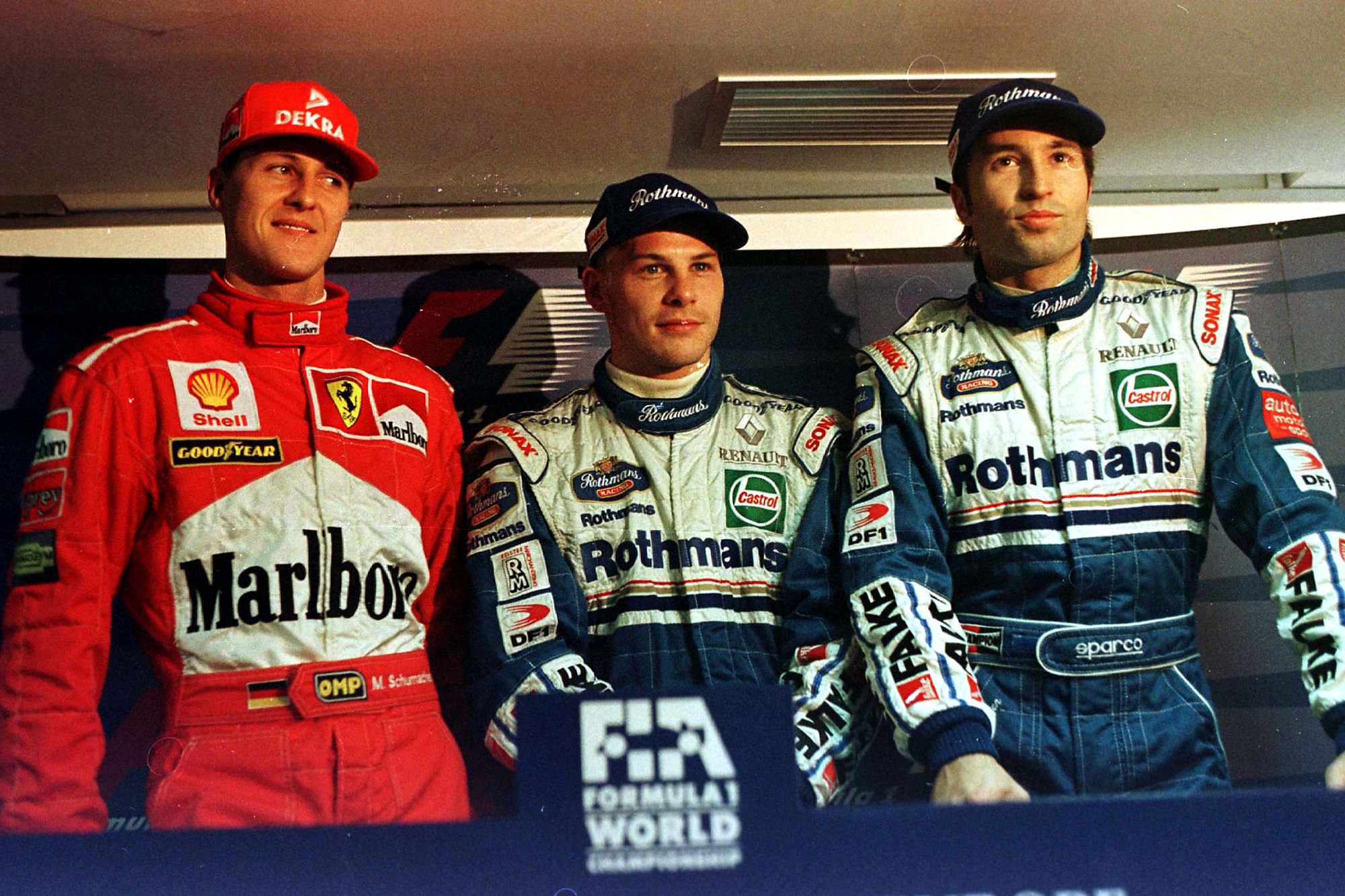
That day, Michael Schumacher ended up in the gravel after a clumsy blocking move on Villeneuve backfired, leaving the Canadian free and clear to secure the title. Three years after his clash with Damon Hill in Adelaide, Schumacher was again under fire from all sides.
What is less well known is what happened later that evening, and how Michael attempted to smooth the waters with the new world champion.
The 1997 season had been all about Villeneuve and Schumacher. Having lost out to Williams teammate Hill the previous year, Villeneuve had completely destroyed his new partner, Heinz-Harald Frentzen.
Instead, he faced an external challenge from Ferrari, in the second year of the Schumacher era. The Maranello team was still searching for the first drivers' title since 1979, but it was regaining momentum under Ross Brawn's technical leadership.
The title battle took an extra twist at the penultimate round in Suzuka, where Villeneuve faced a penalty for a yellow flag offence in practice, and ultimately came away with no points. That meant Schumacher was ahead as we went to the last race, the European GP in Jerez.
Qualifying produced an extraordinary outcome when Villeneuve, Schumacher, and Frentzen all set identical laptimes of 1m21.072s, a bizarre phenomenon not seen before or since. Villeneuve did it first, so he was on pole.
"It was a Hollywood scenario," Villeneuve recalls. "But the whole season was, and that's why it's one of the championships that gets remembered. You couldn't write it. If you wrote it then people will say why do they write something like this? Of course, it cannot happen.
"But yes it did. Apparently, the FIA had another digit, but it doesn't count for the grid. I'm not sure what that last digit was, but I was happier not to know, because maybe it could have been someone else!"
The race itself unfolded perfectly for the championship, with Schumacher leading, and – once he had passed Frentzen after making a bad start – Villeneuve hunting him down in second.
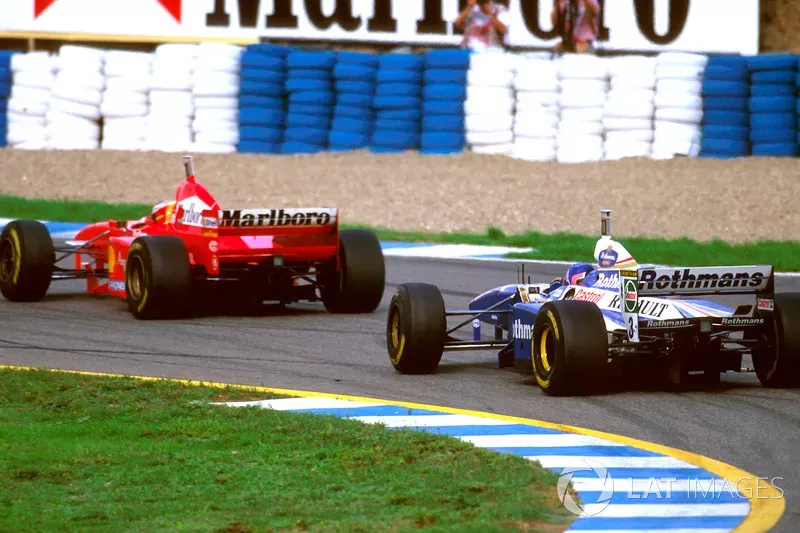
"We had imagined a million plans, and obviously none of them happened!," says Villeneuve. "I got into Turn 1 with Heinz-Harald, we didn't know what to do or who should be in front, and it didn't work out well.
"Then it was just a crazy race, qualifying lap after qualifying lap. I almost crashed a few times, getting closer to Michael, losing a little bit, catching the [Ferrari-powered] Saubers who were told by Ferrari to slow me down – so Norberto Fontana spent a lap slowing me down."
Villeneuve knew that he had to pass Schumacher to guarantee himself the title, and he choose his timing with care.
"I could see all race that I was braking a lot later than Michael, so I could attempt a kamikaze move. If I got a metre closer at the end of the back straight, I could go for it. I knew I could surprise him, and the only way to overtake him was to surprise him. I did my pitstop after him, put on new tyres, and I knew I had two laps on new rubber to do it, and that was it.
"On that lap I came out of the high-speed corner before the back straight, I stayed on it, and even went into the dirt. I took a risk. Then I saw that I was one metre closer to him than every other lap, so I just went for it. Suddenly he realised I was there, so he turned away, and then he turned in again. He did it badly, because he didn't hit my wheels, he hit my sidepod…"
As a professional foul, it was not effective. Schumacher slid off the road and into the gravel, and unlike Hill in Adelaide, Villeneuve was able to continue, although he was worried for a while.
"The car jumped in the air, I still managed to stay on the track luckily, but then I slowed down because I thought something was broken. In fact the battery mounts were broken, and it was only hanging on by the electrical cables. I was just kissing the brakes, hitting them slowly, just to drive the car softly. It's a good thing I did, because otherwise I would not have finished."
In the end, he dropped back to third, as McLaren drivers Mika Hakkinen and David Coulthard went past in a carefully choreographed move, but that was what he needed to guarantee himself the title.
As he stood on the bottom step of the podium, the entire Williams team sported bright yellow wigs in honour of the hairstyle that Villeneuve preferred at that time.
"It was cool when I got on the podium and all the guys had the yellow wigs. It made the moment more special than just winning. And then there were all the guys in Montreal that had gone platinum blond, there were hundreds of them. That showed to me what it meant to other people, what I brought to them as well.
"So it wasn't just a championship for me, it was also for a lot of people and fans. And when you see that you touch people like this, you actually bring them some form of happiness. Then I realised the meaning of it. I didn't until then. I realised after receiving a call from the Prime Minister of Canada, that's when it sunk in that this was special.
"Everything happened super fast, from starting F3 in Italy, going to Japan, going to Atlantic, winning Indy, winning F1. The ball was rolling and the peak was reached super fast."
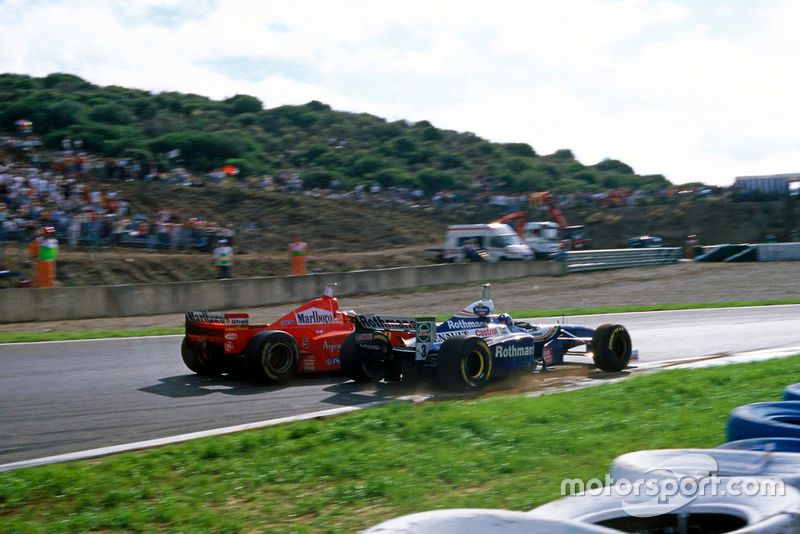
That afternoon mood in the Ferrari camp was downbeat, to say the least. Not only had Schumacher lost the title and the post-1979 wait been extended for another year, it was apparent that some kind of punishment might follow if FIA President Max Mosley pursued the matter.
Then there was the unfortunate matter of the thousands of "Michael Schumacher 1997 world champion" hats that had been produced by his overconfident manager, Willi Weber.
A few samples were in the Ferrari motorhome, and my roommate Eddie Irvine managed to liberate a couple for me. I gave one to Villeneuve's engineer Jock Clear, who promptly put it on as he strolled around the paddock, and kept the other. It still sits on a shelf in my office.
Jerez was also a big story because this was the last race for Renault as a works engine supplier, for the time being at least, and the French manufacturer had arranged a big party for Sunday night – which now turned into a de facto victory celebration. In contrast, that evening's Marlboro event would become something of a wake for the Ferrari folk.
Along with most of the drivers, Villeneuve was staying in the Montecastillo Hotel at the circuit. That evening he dined with his entourage, including manager Craig Pollock, friend and racer Patrick Lemarie, physio Erwin Gollner, and a couple of others. I joined them as they finished, and we decided it was time to head for the Renault function.
We jumped in a couple of taxis, gave the address of the party, and began driving – and driving and driving. We seemed to be halfway to Barcelona before we drove around what appeared to be an industrial estate and finally found the nightclub.
The party was open to all members of the F1 paddock, but Renault had forgotten to invite anybody else, so there wasn't much in the way of local colour. Inevitably people came over to our table to congratulate Villeneuve, and then just as things were starting to warm up, the lights came on, and it was announced that the bar was closed – and it was barely past midnight.
As we made our way out we passed a queue of what seemed like 200 mechanics from up and down the pitlane who had finally finished their day's work, were up for a night out, and were still trying to talk their way in – only to find it that was already game over.
The Villeneuve posse climbed into a couple of taxis, and we headed back to Jerez. It was now a question of finding somewhere with a bit of Sunday night action in what is a sleepy town, even on a race weekend. There was probably some talk of crashing the Marlboro party, but that stopped when we bumped into another convoy of cars at a roundabout on the outskirts of the city.
It was Schumacher, Irvine and the rest of the Ferrari folk. Their own event had finished, and they were also looking for somewhere to go. We compared notes, and there was one answer – back to the hotel and we'll party there.
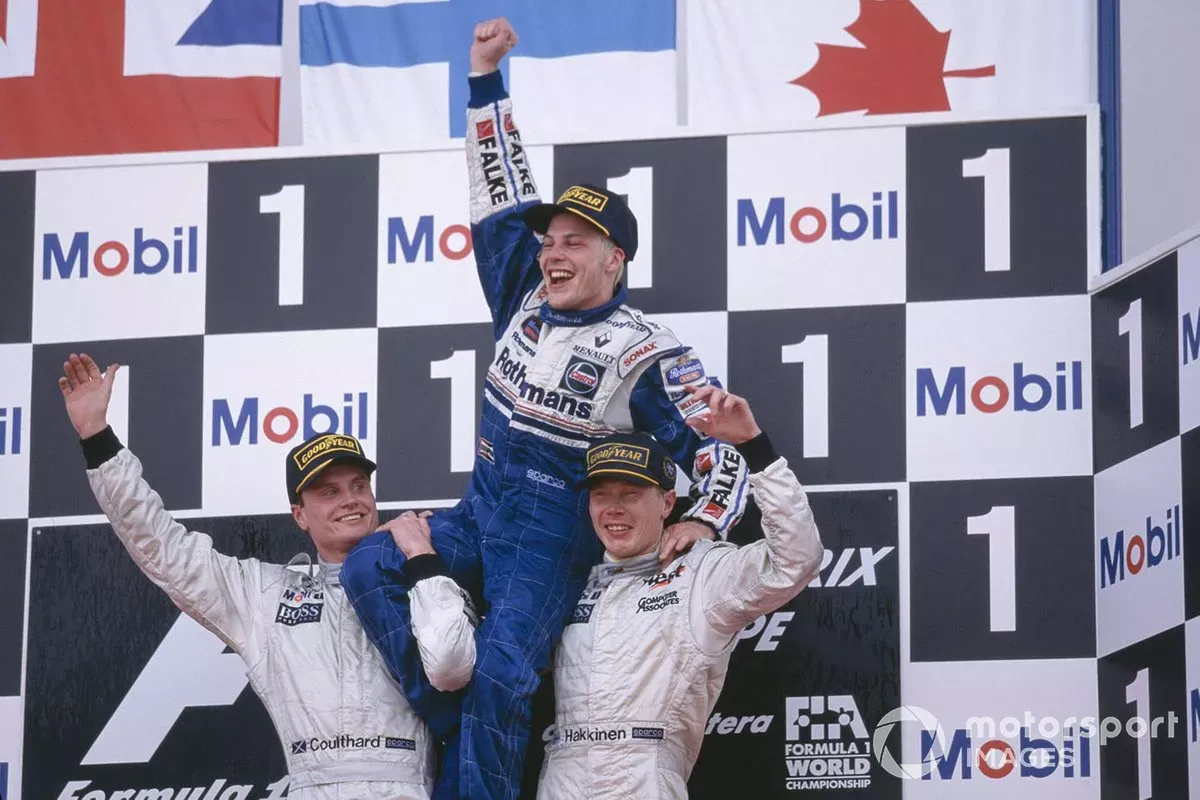
On arrival, we found that the bar was closed, and no amount of persuasion from the World Champion or the runner-up could convince the hotel manager to open it. Plan B soon emerged, which was for everyone to head to their rooms, empty their mini bars, and bring the spoils downstairs.
Soon a big marble table in the middle reception was covered in dozens of little bottles of vodka, whisky and gin, and our impromptu party began to get underway. Things soon turned a little unruly, so the manager changed his mind and opened up the bar – and since he didn't have anyone to run it, Villeneuve and Schumacher took over. I gave Schumacher a yellow JV wig that I had carefully stashed away, and he put it on.
"There was 20 of us and we were making so much noise that someone finally gave us the keys of the bar and said it was OK, just go for it," says Villeneuve. "Someone must have paid for it! So they opened for the bar for us, but there wasn't any barman, it was just us, running it. It was brilliant."
Then it became a proper party. Irvine fetched an acoustic guitar from his room and tried to play a few tunes – the intro of Pink Floyd's Wish You Were Here was about his limit – while Schumacher's physio turned some bins upside down to provide bongo accompaniment.
Behind the bar the be-wigged Schumacher was all smiles and trying to make small talk with a slightly reluctant Villeneuve. It was an extraordinary thing to see, given the intensity of their battle on track, and the controversy that was still brewing.
"It was strange, but there was a reason for it. There was no talk about the accident, it was just having a good time and being barmen, serving drinks to everyone. It was fun, he played along, he was a good actor! And I'm sure that a part of him had fun as well, because he did enjoy having a good night out.
"Personally at the moment I thought it was cool, because that's the kind of thing I would have done. 'OK, you've beaten me.' That's the way it was with Damon the year before. At that moment I didn't see what was coming right after."
Gradually everyone faded away and went to bed. The last four people left standing were Villeneuve, myself and two family friends of the Schumachers. We ended up having breakfast in the hotel restaurant, until Villeneuve was called away on Rothmans duty at 8am or so. Having had no sleep he now had to conduct a series of worldwide TV interviews via satellite.
"The filming was tough! But with the energy of winning the championship, you can skip a night. I was 26, so it was fine. Today it wouldn't work, I'd be in bed at midnight..."
A few days later, as the political fallout over Schumacher's move began to ramp up, pictures of the hotel party appeared in a German tabloid. They showed Schumacher and Villeneuve apparently in a pally mood beyond the bar, as if nothing untoward had happened a few hours earlier.
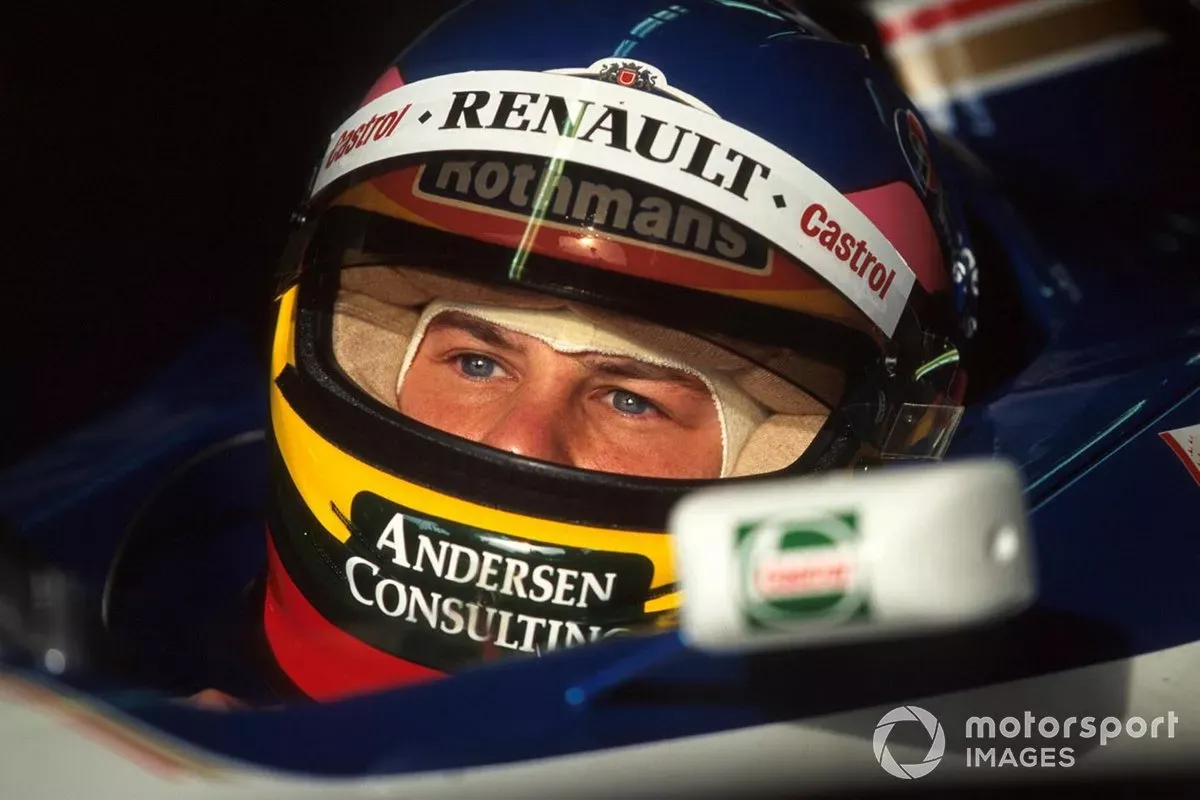
This was in the days before iPhones and the like. Only one camera was in the room that night, and it belonged to someone very close to Schumacher. Villeneuve's conclusion was that the pictures had been leaked to paint Schumacher in a good light.
"He used it to take pictures, to clean things up," said Villeneuve. "The story was, 'It shows I didn't do anything bad during that race, because look, we're friends.' That's what got me upset, and I didn't see it coming."
If it was just a simple PR move, it had a limited impact – after an FIA hearing Schumacher lost his second place in the world championship, a punishment that in truth meant almost nothing,
For Villeneuve, who recently celebrated his title anniversary with a run in a 2021 Alpine courtesy of Renault, the memories of that weekend are vivid.
"No, honestly, that's the weirdest thing, memory does not age, there's no timing in memory. If you remember it, it could be yesterday, there's no lapse. It could have been two or three days ago. I know it wasn't yesterday, because I don't have a hangover today. But that's about it…"
I still have my "1997 world champion" cap. For years I toyed with the idea of asking Schumacher to sign it, but my fear always was that he wouldn't appreciate seeing it again – and might well decide not to give it back to me.
Meanwhile, Jock Clear also still has the one I have him, a prized souvenir of that season. Ironically he went on to work with Schumacher at Mercedes, and later moved to Maranello, where he still works.
"I remember it like it was yesterday," says the Ferrari senior performance engineer. "And honestly, we often say nothing changes in F1, but everything changes, so much has developed.
"But I look at what's going on here and we're just doing the same things, and we're still enjoying it, But 25 years ago? That's crazy…"